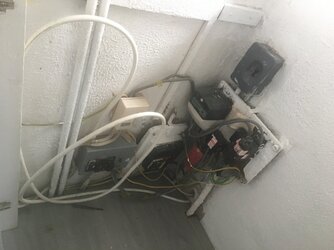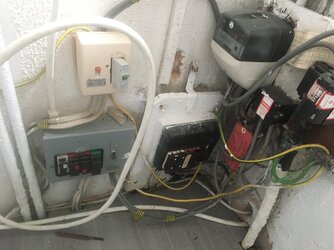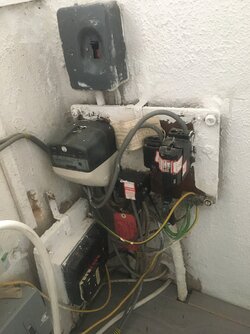D
You are using an out of date browser. It may not display this or other websites correctly.
You should upgrade or use an alternative browser.
You should upgrade or use an alternative browser.
Lets see how this works out !
Does this mean I can charge ?
Now all they'll have to do is spend the next 15 years arguing exactly what the "Right qualifications" are and how they're going to apply that to existing and past ones.
D
Dustydazzler
I have been in the trade around 25 years and to this day no one has given me a straight answer what is a 'Qualified' electrician
And a further thought.
The Proposed legislation would protect the title Electrician.
Overnight there will be a raft of signage change on vans and letter headings to Elektrician, or Electrition, or Lectrician or many other variants that couldn't possibly be covered.
Not forgetting Electrical contractor, Electrical Installer, Socket fixer,,,,,
The Proposed legislation would protect the title Electrician.
Overnight there will be a raft of signage change on vans and letter headings to Elektrician, or Electrition, or Lectrician or many other variants that couldn't possibly be covered.
Not forgetting Electrical contractor, Electrical Installer, Socket fixer,,,,,
D
Dustydazzler
You joke but when I started my own business I had a solicitor tell me to drop 'Qualified Electrician' from my business cards and letter headings
- Aug 12, 2017
- 14,313
- 20,712
- 3,557,381
- 51
- If you're a qualified, trainee, or retired electrician - Which country is it that your work will be / is / was aimed at?
- United Kingdom
- What type of forum member are you?
- Practising Electrician (Qualified - Domestic or Commercial etc)
My van doesn’t even say “ electrician”…. It’s my name and “electrical services”
Will this bring an end to selling electrical gear to general public in orange sheds?
Will this bring an end to selling electrical gear to general public in orange sheds?
- May 25, 2011
- 6,161
- 7,152
- 10,256,798
- If you're a qualified, trainee, or retired electrician - Which country is it that your work will be / is / was aimed at?
- United Kingdom
- What type of forum member are you?
- Practising Electrician (Qualified - Domestic or Commercial etc)
Could be interesting in my world - 'Electrician' is a protected title by the film and TV types, and does not reflect what we would define as an electrician at all!
There would have to be different "levels" of qualification, as there is in, say, the medical profession, so that the actual qualification anyone claims is restricted to some degree that is understandable by the general public.
My GP is a qualified doctor, but he's not "qualified" to do surgery as that requires further qualifications. A surgeon with all the additional required qualifications might be ok to stand -in for a GP but not vice-versa. However, many specialist surgeons concentrate on particular areas of expertise, so, for example, a surgeon who concentrates exclusively on hip replacements isn't going to do cataract operations and so on. That's why the medical profession has so many levels, so if a doctor has passed extra exams and done all the studying and clinical practice he can then do the surgery for which he is "qualified". He would probably be useless as a GP though! However, he is "qualified" to do so, as he is over-qualified, but he probably wouldn't have any interest in that post, and should he retire from specialst surgery and seek a post as a GP in the years immediately prior to retiring, he will need additional specialist training just to cope with the essentials of dealing with every patient who crosses his door and also training to deal with the prescribing and paperwork etc. This does not mean he will have the "bedside manner" a good GP needs, but he will have a good knowledge of general medicine, plus the NHS backup for assistance when required.
The medics have clearly defined levels, and they are tested at each level. Electricians do not have these prescribed levels, only a few restrictions designed to ensure some level of competence.
If I pass an exam that shows I am competent to install, inspect, test and certify in domestic installations, I am "qualified"...but unlikely to have a clue about installing more complex features which truly require more teaching and hands-on experience.
All well and good...but who is going to set out the rules for these levels, who is going to teach these courses, where and at what cost?
No new law that bans unqualified people from doing electrical work is going to work unless the training and testing infrastructure is in place, because without those elements there is no way someone can become "qualified".
Even if colleges had such courses in place, who is to determine what level of "qualification" is required for the teachers of these courses?
Yes, I know there are some "levels" in place but they are poorly defined, and it's clear that those seeking to become proper electricians have difficulty in getting training for hands-on experience etc.
Even if there were proper courses, like some of the colleges do provide at present, places are limited and it takes a long time to cover all that is required in theory and in practice, and many will be unable to afford the cost.
Assuming there were to be a "basic" course so that one could become a proper, qualified, domestic installer, that person would have to complete another year or two at college and in the field before moving up a level, all of which is extremely difficult for a working electrician trying to make a living and support a family. I could go on...
My GP is a qualified doctor, but he's not "qualified" to do surgery as that requires further qualifications. A surgeon with all the additional required qualifications might be ok to stand -in for a GP but not vice-versa. However, many specialist surgeons concentrate on particular areas of expertise, so, for example, a surgeon who concentrates exclusively on hip replacements isn't going to do cataract operations and so on. That's why the medical profession has so many levels, so if a doctor has passed extra exams and done all the studying and clinical practice he can then do the surgery for which he is "qualified". He would probably be useless as a GP though! However, he is "qualified" to do so, as he is over-qualified, but he probably wouldn't have any interest in that post, and should he retire from specialst surgery and seek a post as a GP in the years immediately prior to retiring, he will need additional specialist training just to cope with the essentials of dealing with every patient who crosses his door and also training to deal with the prescribing and paperwork etc. This does not mean he will have the "bedside manner" a good GP needs, but he will have a good knowledge of general medicine, plus the NHS backup for assistance when required.
The medics have clearly defined levels, and they are tested at each level. Electricians do not have these prescribed levels, only a few restrictions designed to ensure some level of competence.
If I pass an exam that shows I am competent to install, inspect, test and certify in domestic installations, I am "qualified"...but unlikely to have a clue about installing more complex features which truly require more teaching and hands-on experience.
All well and good...but who is going to set out the rules for these levels, who is going to teach these courses, where and at what cost?
No new law that bans unqualified people from doing electrical work is going to work unless the training and testing infrastructure is in place, because without those elements there is no way someone can become "qualified".
Even if colleges had such courses in place, who is to determine what level of "qualification" is required for the teachers of these courses?
Yes, I know there are some "levels" in place but they are poorly defined, and it's clear that those seeking to become proper electricians have difficulty in getting training for hands-on experience etc.
Even if there were proper courses, like some of the colleges do provide at present, places are limited and it takes a long time to cover all that is required in theory and in practice, and many will be unable to afford the cost.
Assuming there were to be a "basic" course so that one could become a proper, qualified, domestic installer, that person would have to complete another year or two at college and in the field before moving up a level, all of which is extremely difficult for a working electrician trying to make a living and support a family. I could go on...
Will this bring an end to selling electrical gear to general public in orange sheds?
No, for (at least) 2 reasons.
First, the idea of protecting the title Electrician will on it's own serve no purpose so it's a none starter.
Second, if the plan is also to restrict the sales of electrical installation materials (if they could ever define that) to only persons who are qualified / allowed to use the title Electrician and also restrict the sale of materials to (Approved / licenced ??) wholesalers then the black market for materials would go wild.
There would be people who are entitiled to buy, reselling to others who aren't.
Instead of booze runs to France, there'd be cable runs.
The best example of a failed attempt to bring in controls and prohibitions, is alchohol in the U.S in 1920 / 30's.
As Pirate has said there's too many levels that would need covering, let alone defining those levels in the first place.
- Aug 12, 2017
- 14,313
- 20,712
- 3,557,381
- 51
- If you're a qualified, trainee, or retired electrician - Which country is it that your work will be / is / was aimed at?
- United Kingdom
- What type of forum member are you?
- Practising Electrician (Qualified - Domestic or Commercial etc)
Because of the draconian alcohol rules in Scotland, we do a “booze cruise” to Berwick every week.
It’s another reason I don’t want an independent Scotland that could mess up our industry as we’ll probably be told to go back to old colours…. Or invent a new, tartan based, colour scheme.
It’s another reason I don’t want an independent Scotland that could mess up our industry as we’ll probably be told to go back to old colours…. Or invent a new, tartan based, colour scheme.
Imagine if you inadvertently installed a Campbell tartan cable in a Macdonald household!!!
But that's how you tell the conductors apart
Campbell tartan (dress) = line
Macdonald tartan (dress) = neutral
Macpherson tartan (dress) = cpc
Of course this is fixed wiring, flexible cables use the hunting tartan equivalents.
There phase has Macduff and Stewart for the other phases.
(Let's not get into arguments about which three phase tartan should be used as neutral when used as single phase three and earth!)
- Aug 12, 2017
- 14,313
- 20,712
- 3,557,381
- 51
- If you're a qualified, trainee, or retired electrician - Which country is it that your work will be / is / was aimed at?
- United Kingdom
- What type of forum member are you?
- Practising Electrician (Qualified - Domestic or Commercial etc)
Imagine if you inadvertently installed a Campbell tartan cable in a Macdonald household!!!
We might be allowed to use the trained haggis again as underfloor cable runners.
I really like the idea of using the hunting variants for flexible!
Plus, you could charge extra for those who wanted their own specific tartan cables, say a Buchanan or McIntosh...dress for fixed, hunting for flexible...the possibilities are endless!
More tartans for special locations too!
Plus, you could charge extra for those who wanted their own specific tartan cables, say a Buchanan or McIntosh...dress for fixed, hunting for flexible...the possibilities are endless!
More tartans for special locations too!
N
nicebutdim
Seriously underrated comment.Bad Electricians Charge The Earth!
- Feb 26, 2013
- 1,039
- 1,036
- 1,688
- 45
- If you're a qualified, trainee, or retired electrician - Which country is it that your work will be / is / was aimed at?
- United Kingdom
- What type of forum member are you?
- Practising Electrician (Qualified - Domestic or Commercial etc)
Upcoming CU change for the end of the month!
kind of looking forward to it, stripping out that dogs dinner!
kind of looking forward to it, stripping out that dogs dinner!
Attachments
sinewove
~
- Mar 29, 2014
- 190
- 108
- 1,218
- If you're a qualified, trainee, or retired electrician - Which country is it that your work will be / is / was aimed at?
- United Kingdom
- What type of forum member are you?
- Practising Electrician (Qualified - Domestic or Commercial etc)
- Business Name
- R L ELECTRICAL
Don't forget to book the seal fairy for the installUpcoming CU change for the end of the month!
kind of looking forward to it, stripping out that dogs dinner!

- Feb 26, 2013
- 1,039
- 1,036
- 1,688
- 45
- If you're a qualified, trainee, or retired electrician - Which country is it that your work will be / is / was aimed at?
- United Kingdom
- What type of forum member are you?
- Practising Electrician (Qualified - Domestic or Commercial etc)
They always seem to have already fallen off before I arriveDon't forget to book the seal fairy for the install

- Aug 12, 2017
- 14,313
- 20,712
- 3,557,381
- 51
- If you're a qualified, trainee, or retired electrician - Which country is it that your work will be / is / was aimed at?
- United Kingdom
- What type of forum member are you?
- Practising Electrician (Qualified - Domestic or Commercial etc)
Didn’t you hear? The seal fairy’s are on strike.Don't forget to book the seal fairy for the install
They’re calling for the same benefits and pension as the tooth fairy industry.
Similar threads
- Replies
- 4
- Views
- 554
- Replies
- 29
- Views
- 2K
- Replies
- 10
- Views
- 2K
- Replies
- 3
- Views
- 212
- Replies
- 24
- Views
- 713
- Replies
- 3
- Views
- 223
- Replies
- 2
- Views
- 833
- Replies
- 2
- Views
- 251
- Replies
- 0
- Views
- 59
- Replies
- 26
- Views
- 621
- Replies
- 0
- Views
- 194
A
- Replies
- 0
- Views
- 196
A
OFFICIAL SPONSORS







These Official Forum Sponsors May Provide Discounts to Regular Forum Members - If you would like to sponsor us then CLICK HERE and post a thread with who you are, and we'll send you some stats etc




